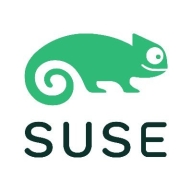

SUSE Linux Enterprise and Oracle Solaris are competing in the enterprise operating systems category. SUSE Linux Enterprise has an advantage in SAP HANA support and enterprise flexibility, while Oracle Solaris offers superior virtualization technologies.
Features: SUSE Linux Enterprise is recognized for its support for SAP HANA, its cloud and on-premises flexibility, and the YaST administration tool for user-friendly server management. It also includes robust security features and efficient performance in enterprise settings. Oracle Solaris features advanced virtualization technologies such as Zones and LDOMs, offering high stability and scalability. It includes ZFS and DTrace for effective resource management and troubleshooting, making it ideal for Oracle database environments.
Room for Improvement: SUSE Linux Enterprise could improve by streamlining its package management and offering clearer documentation for third-party integrations. Enhancements in cloud compatibility and more competitive pricing would also benefit users. Oracle Solaris requires easier hardware certification and enhanced GUI support, and its complex licensing and UI need attention. Users also seek more comprehensive documentation for simpler adoption.
Ease of Deployment and Customer Service: SUSE Linux Enterprise is widely deployed in various environments including public and hybrid clouds with generally positive support experiences. Some users note the need for better real-time support engagement. Oracle Solaris is favored in on-premises setups and typically provides adequate support, especially when used with Oracle hardware, though user experiences with support can vary.
Pricing and ROI: SUSE Linux Enterprise is valued for its affordability and potentially high ROI, particularly in SAP deployments, and offers a straightforward licensing structure. Oracle Solaris is free with Oracle hardware, but the support costs can be significant, and its complex licensing could deter adoption. However, it remains cost-effective for those heavily integrated with Oracle systems due to its integration benefits.
In terms of ROI, there have been performance improvements because Oracle Solaris is lighter.
I have seen a return on investment by switching our clusters from on-prem to Azure public cloud, using our same Bring Your Own Licenses, which saved costs on licensing.
The technical support by Oracle is good.
SUSE Linux Enterprise provides a stable, secure, and well-supported platform for enterprise workloads, with powerful management tools and robust support for clustering, cloud, and containers.
I rate the customer service 10 out of 10 because SUSE has 24/7 availability support, extended support, security, multi-Linux distribution support, upgradation, and everything is user-friendly.
The customer support is good; whenever we have opened a case, they have provided detailed explanations of the issues and resolutions.
Regarding vertical scalability, Oracle Solaris is probably one of the most scalable operating systems in the industry.
SUSE Linux Enterprise is widely recognized for its strong scalability, making it suitable for organizations of all sizes, from small businesses to global enterprises.
Its scalability is quite good since we are using Azure, which allows us to easily scale up or down our resources as needed.
The servers work properly, provide alerts for high CPU and memory usage, but do not encounter CPU or memory issues.
I would rate stability for SUSE Linux Enterprise an eight out of ten.
Because of the cloud, one of the biggest challenges for customers who are using Oracle Solaris is that they do not have any options.
Oracle Solaris needs to improve its compatibility with office tools like Excel.
Security is a top concern, and further strengthening default security policies, simplifying compliance management, and integrating advanced vulnerability management tools would be a valuable improvement.
The software manager was different, making it challenging to install certain applications.
The license we subscribed to should carry over within the same instance family.
I find the pricing of Oracle Solaris to be affordable compared to competitors like Windows.
I would rate pricing for SUSE Linux Enterprise considering one is a high price and ten is a low price.
Upgrading an instance results in overlapping or double subscription fees.
The licensing cost is a bit high.
The operating system is lightweight, which makes it easier to use on an average computer compared to systems like Windows.
Additionally, regarding security, you do not have to implement any antivirus software.
The best features SUSE Linux Enterprise offers include a streamlined installation process with the YaST installer, thorough documentation, and tools such as AutoYaST that enable automated, repeatable deployment.
The LVM is very easy to configure, along with simple disk scanning compared to other systems.
SUSE has a high availability cluster with syncing, and in production environments where zero downtime is expected, the high availability SAP cluster helps us to keep production up 24/7.
| Product | Market Share (%) |
|---|---|
| SUSE Linux Enterprise | 5.8% |
| Oracle Solaris | 1.8% |
| Other | 92.4% |


| Company Size | Count |
|---|---|
| Small Business | 21 |
| Midsize Enterprise | 5 |
| Large Enterprise | 31 |
| Company Size | Count |
|---|---|
| Small Business | 8 |
| Midsize Enterprise | 11 |
| Large Enterprise | 22 |
Oracle Solaris is a trusted business platform that provides consistent compatibility, is simple to use, is always secure, and is designed to help you run your modern and legacy enterprise applications. The solution is the most recommended enterprise operating system for Oracle Database and Java applications and is engineered for large-scale enterprise deployments.
Oracle Solaris Features
Oracle Solaris has many valuable key features. Some of the most useful ones include:
Oracle Solaris Benefits
There are many benefits to implementing Oracle Solaris. Some of the biggest advantages the solution offers include:
Reviews from Real Users
Below are some reviews and helpful feedback written by PeerSpot users currently using the Oracle Solaris solution.
A CEO at a computer software company says, “The most valuable feature is virtualization. They have attained virtualization and it's quite simple to create the Oracle Solaris zones. The solution is quite powerful. Oracle Solaris is great due to the fact that it actually is meant for high-end servers. The high availability is great. You can clone and you can do quite a number of things with them. There's also the ZFS File system which is very good. Is one of the best file systems that there is.”
Diego A., Oracle ACE - Specialized in Systems Technologies at Telecom Argentina, mentions, “The most valuable features for me are virtualization (Containers, Zones, Security, PDOM's, LDOM's) and Performance, ZFS, Debugging with Dtrace.”
A Service Manager at a tech services company expresses that the solution is “Stable, scalable, and has easy installation.”
PeerSpot user Marcel H., Oracle ACE Director "Solaris," CEO, Enterprise Consultant at JomaSoft, explains, “Solaris includes two virtualization solutions: LDoms for SPARC and Solaris Zones. Both solutions can be combined to create private clouds. Solaris Zones is ideal to separate applications and to migrate from older to current hardware. LDoms is very efficient because it uses the hardware hypervisor of the SPARC servers. Both technologies increase Security, because they separate the applications from each other. Using the Security Compliance Framework we are sure the systems are set up properly.”
Shafiq K., Senior Manager IT Operations at a financial services firm, states, “The reliability of the solution is excellent. The security has been very good overall. We've found the solution to have good availability. The backup capabilities are quite good. The solution has proven to be quite stable so far. The product can scale. The solution is 100% free to use. It doesn't cost a company anything as it's embedded in the hardware.”
SUSE Linux Enterprise offers features like YaST for server management, seamless integration with Oracle and SAP, and a robust security setup. Renowned for stability, it efficiently supports workstations, SAP workloads, and cloud migrations across diverse industries.
SUSE Linux Enterprise is known for its lightweight design, high performance, and ease of installation. Its flexible architecture supports extensive documentation and efficient patching. The system uses the BTRFS file system for effective virtualization, and community support is significant. However, challenges include package updates causing conflicts, difficult initial setup and software management, high pricing, and support response times. Improvements in security compliance, cloud integration, hardware compatibility, and documentation are also needed.
What are SUSE Linux Enterprise's important features?
What benefits should users expect from using SUSE Linux Enterprise?
Industries like healthcare and banking use SUSE Linux Enterprise for secure transactions and structured application deployment. It is also a choice for organizations involved in testing, automation, and web development, offering support for SAP HANA integration and facilitating cloud migrations.
We monitor all Operating Systems (OS) for Business reviews to prevent fraudulent reviews and keep review quality high. We do not post reviews by company employees or direct competitors. We validate each review for authenticity via cross-reference with LinkedIn, and personal follow-up with the reviewer when necessary.